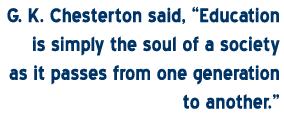by Brett Vaden
Last week I wrote about what makes a Christian school Christian: at the heart of a Christian school is not its church-affiliation or denomination, nor its political or cultural allegiance, but its subjection to Christ. When a school truly lives up to the name ‘Christian,’ it will be one that doesn’t just teach stellar Bible classes, but that provides an excellent education in all areas, from history, to math, to literature, and so on, so that God is glorified.
To the degree that a school does this, it will be primed to take a secondary but very important step, to commit itself to the classical model of education. What makes a school classical? And why would a Christian school desire to be classical?
The aim of classical education is to take the best of what human beings have thought and said and pass it down to future generations. G. K. Chesterton said, “Education is simply the soul of a society as it passes from one generation to another.” A classical education seeks to pass on the soul not just of our present, modern society and all that is good about it, but to entrust students with the wisdom of the ages. As my friend Martin Cothran says, this wisdom can be divided into three kinds, that of spiritual man, speculative man, and practical man.
 Classical education begins, first and foremost, with the biblical history of the Israelites and the teaching of Christianity. What students receive from this study is the wisdom of “spiritual man.” The narrative of Scripture is the story of humanity’s pilgrimage from life, to death, to resurrection. By studying the biblical account, students are enabled to eventually grapple with and come to terms with the meaning of our existence.
Classical education begins, first and foremost, with the biblical history of the Israelites and the teaching of Christianity. What students receive from this study is the wisdom of “spiritual man.” The narrative of Scripture is the story of humanity’s pilgrimage from life, to death, to resurrection. By studying the biblical account, students are enabled to eventually grapple with and come to terms with the meaning of our existence.
Second, classical education also teaches the wisdom of “speculative man” by passing on the philosophical, theoretical, and ethical thought of ancient Greece. Contrary to what many might think, human beings have been thinking deep thoughts for a long time. In many ways the Greeks thought more deeply than we do. They didn’t always have the right answers, but they knew the right questions, such as, What’s real, and how do we know? What is the difference between good and evil? How should a society govern itself? What is the good life, or what are the ingredients of human flourishing? What is the physical world made of at the smallest level? It is chiefly to the Greek philosophers that all the branches of science owe homage. They asked the deep questions of life that go beyond the day-to-day concerns—as important as those are—and push us to discover truth.
Third, classical education teaches the wisdom of “practical man” by conserving the history, language, and literature of ancient Rome. Rome survived as a dominant world power for 12 centuries–that’s 6 times longer than the United States has been around. What made them last? In part it was due to their political savvy; the Roman republic inspired the form of our own government. In part it was due to Rome’s military prowess. But to a great extent it was something more basic: their devotion to order and efficiency. This devotion is seen in their technological and architectural feats, some of which were not rivaled until the 19th and 20th centuries. For example, the Romans perfected the use of concrete, especially in building their roads; many Roman highways were still in use 1,000 years after Rome fell. But you don’t have to look any further than Rome’s language to appreciate their mastery of ordered, logical thinking. Latin is a centerpiece of classical education, because it trains students’ minds to think with precision: to analyze and take things apart, to synthesize and put them back together, and to understand the logic of words and language.
To summarize, classical education passes on the spiritual, speculative, and practical wisdom that humans have amassed for the past few thousand years. It doesn’t commit the fault of “chronological snobbery,” i.e., of assuming that what we know now is the only wisdom worth knowing, and that whatever past generations knew is obsolete. What a ridiculous and foolish idea! Thankfully, classical education has been revived in many ways, and it has never been completely snuffed out, surviving through the place given in many colleges and universities to the “liberal arts.” Traditionally, teaching the liberal arts meant giving students the following skills, facilities, or ‘arts’: grammar, dialectic, rhetoric, arithmetic, geometry, music, and astronomy. The liberal arts are the skills needed for a person to become a free or liberated person, i.e., someone who no longer needs a tutor, but who is wise and virtuous enough to think and decide for him or herself. That, ultimately, is the purpose of classical education, to form and fill children with wisdom and virtue, so that they can live as truly free people–free not just to attend a good college, to land a good job, or to build up a good 401K, but to live a good life.


